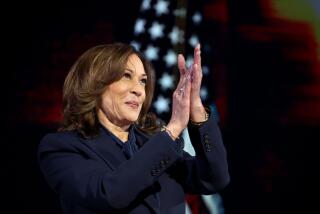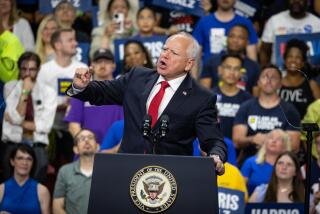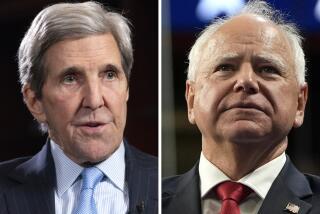Kerrey Tells Bush to Put Draft Issue to Rest : Vietnam: The veteran urges the President to honor his pledge to heal war wounds and ‘call off the dogs’ hounding Clinton about his record.
Sen. Bob Kerrey (D-Neb.), who predicted last spring that Republicans would use Bill Clinton’s draft record to open him up “like a soft-shelled peanut,” criticized President Bush on Thursday for trying to do exactly that, urging Bush to “call off the dogs.”
Kerrey’s own service in Vietnam--he lost a leg and won the Medal of Honor for his exploits as a Navy Seal--was a centerpiece of his try for this year’s Democratic nomination. During the primary campaigns, his aides on several occasions circulated information to reporters about Clinton’s draft status, actions that led Kerrey at one point to suspend a key adviser.
In a speech on the Senate floor, Kerrey accused Bush of forgetting his pledge to heal the wounds of Vietnam, and warned him that, if he insists on judging Clinton by what he did 23 years ago, that Bush himself may be so judged.
Kerrey conceded that Bush’s tactics “appear to be working” in weakening Clinton’s support, particularly in the South. And he made little direct defense of Clinton’s behavior, saying only that Clinton’s “memory lapses” about his dealings with his draft board were “as understandable as they are common” among people his age.
“While my first concern and sympathy goes to those men and women who fought in the war, I am also sympathetic with those like Bill Clinton who made other decisions,” Kerrey added.
But although his words on Clinton were tepid, Kerrey’s attacks on Bush were heated. Bush’s actions show he “chooses to divide us again,” Kerrey said. Referring to Bush’s inaugural address in 1989, Kerrey said Bush in the past has been “sensitive to the need for healing” the nation’s wounds over Vietnam, understanding how those wounds have “incapacitated individual combatants as well as the nation.”
“Now, when the smell of political blood is in the air, you abandon your earlier and correct intention,” he said, addressing the President directly. Bush’s actions, Kerrey said, “jeopardize the healing.”
“The hunger for reelection has gotten the better of you.”
In his inaugural address, Bush decried the divisiveness among Americans that, he said, has existed since Vietnam. The final lesson of that war, he said, “is that no great nation can long afford to be sundered by a memory.”
If the Republicans want voters to examine Clinton’s actions 23 years ago, Kerrey said, those same voters should ask about what role Bush played in the decisions that prolonged the war and that led to the ever-debated return of U.S. prisoners of war. “Do you want us to judge you by what you did then? Do you want us to make our decisions about your reelection according to your acquired standard of accuracy in recall?”
He also scored Bush for comparing World War II--which the President served in--to Vietnam, saying that no one thought the country’s survival was at stake in Vietnam.
Kerrey also obliquely raised the issue of Republicans of Clinton’s generation who failed to serve in Vietnam. Bush, he said, was trying to make the issue one of Clinton’s credibility about the draft issue instead of whether he served in Vietnam “to protect prominent Republican leaders who avoided serving.”
Among the Republicans of Clinton’s age who did not serve in Vietnam are Defense Secretary Dick Cheney, who received four student deferments before obtaining a final deferment when he and his wife had a child, Republican National Committee Chairman Richard N. Bond, whose draft board in New York never called him despite a relatively low lottery number and Bush’s eldest son, George W. Bush, who enlisted in the National Guard in 1968, the same year Clinton graduated from college.
Clinton has acknowledged that he took steps intended to avoid military service. But he has denied that he did anything improper, and has insisted that he “told the truth.” His draft status received renewed attention in the last week in light of disclosures that his uncle successfully lobbied to get him a slot in the naval reserve--which Clinton did not take and says he did not know about until last March.
More to Read
Get the L.A. Times Politics newsletter
Deeply reported insights into legislation, politics and policy from Sacramento, Washington and beyond. In your inbox three times per week.
You may occasionally receive promotional content from the Los Angeles Times.











